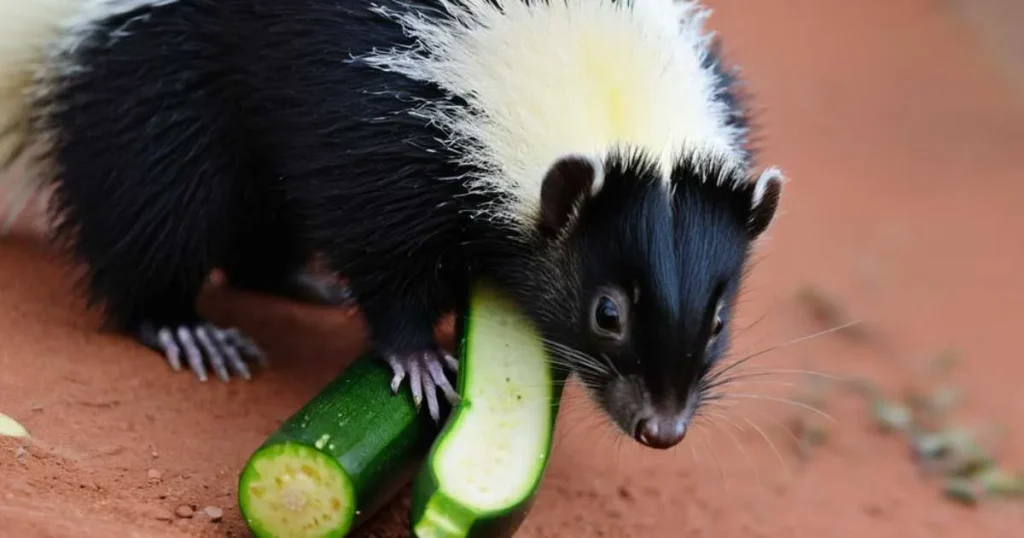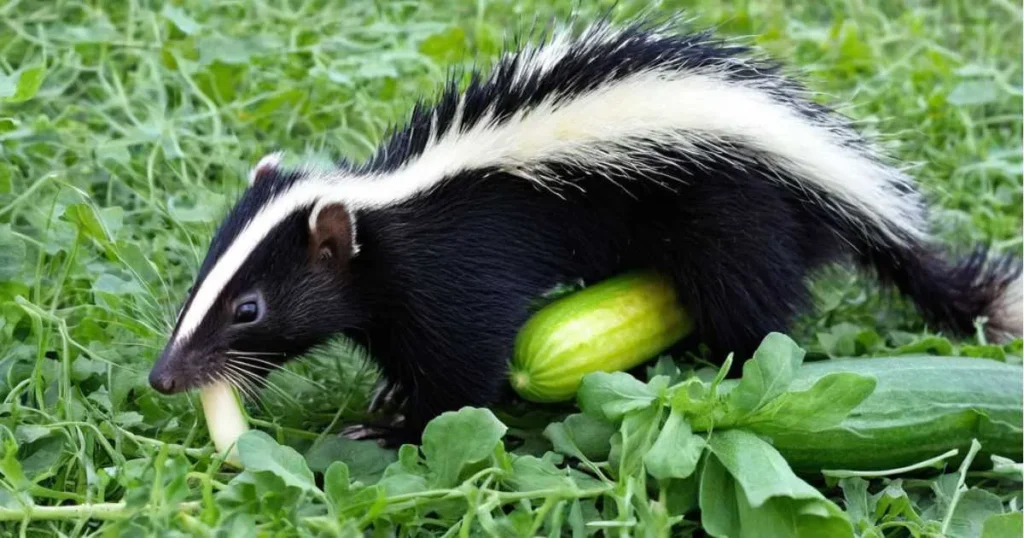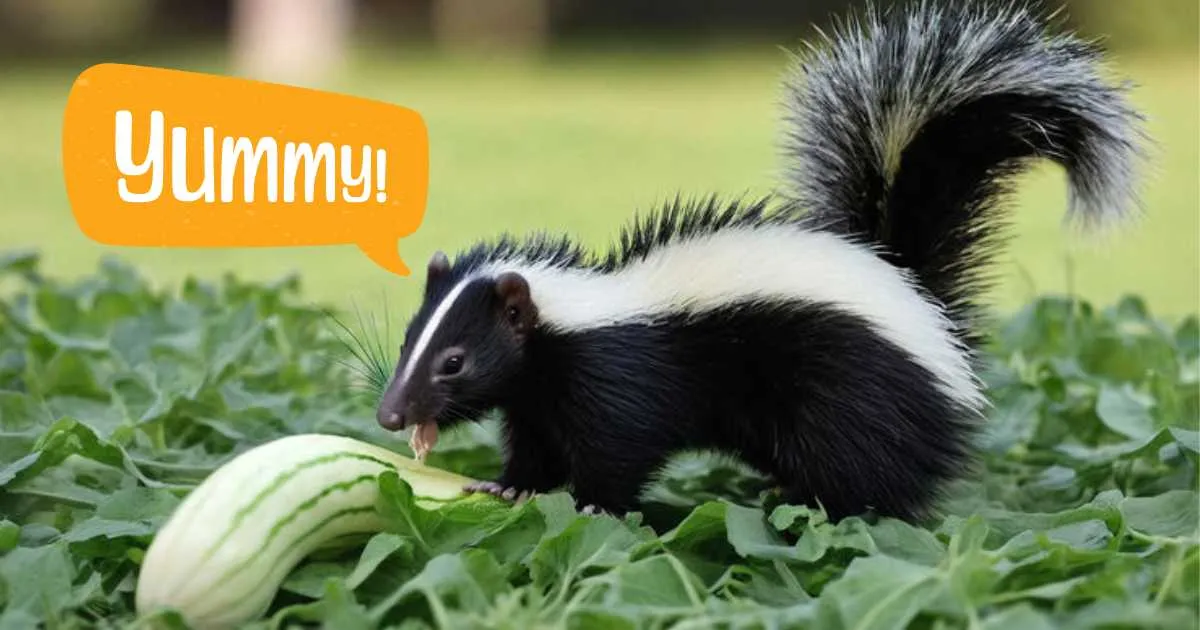Can Skunk Eat Zucchini? Save Your Garden
Last updated on August 27th, 2024 at 02:56 am
Did you know that skunks can munch on your zucchini? As a skunk pet owner and wildlife researcher, I’ve seen firsthand how these black-and-white creatures enjoy a varied diet, including vegetables like zucchini. Skunks are opportunistic eaters, meaning they’ll eat whatever’s available, from insects and small animals to fruits and vegetables. If you’ve noticed nibbled zucchini in your garden, it might be the work of a nocturnal skunk looking for a tasty snack. Keep reading to learn more about what skunks eat and how to manage these unexpected garden visitors.
Skunks In The Wild: Diet Preferences
Venture into the world of the skunk’s culinary tastes and you might be surprised
to find these creatures are more than just their notorious scent. These nocturnal foragers
have diverse palettes. So, do skunks eat zucchini? Let’s dissect their diet preferences.
Primary Food Sources
Skunks are omnivores with a wide-ranging appetite. Their menu includes:
- Insects: Beetles, larvae, and bees
- Small rodents: Mice and voles
- Fruits and vegetables: Yes, they enjoy zucchini!
- Plants: Leaves and grasses
- Fungi: Mushrooms
This variety ensures optimal nutrition for survival in the wild.
Seasonal Diet Variations
As seasons change, so does the skunk’s diet:
| Season | Food Items |
|---|---|
| Spring | Insects and small animals |
| Summer | Fruits like zucchini, unavailable in other seasons |
| Fall | Nuts and seeds as they prepare for winter |
| Winter | Scavenge more due to limited resources |
Skunks adapt their diet to what’s available and abundant in each season.
Zucchini: A Garden Favorite
Zucchini, a member of the squash family, reigns as a garden favorite due to its ease of growing and versatility in recipes. This prolific vegetable offers both beauty and bounty, making it a beloved choice for garden enthusiasts.

Nutritional Value
Zucchini provides a substantial nutritional punch. Rich in essential nutrients, it contributes to a balanced diet. See the benefits:
- Low in calories: Great for weight management.
- Vitamins A and C: Boosts immunity and vision health.
- Potassium: Supports heart health.
- Fiber: Aids in digestion.
Popularity Among Gardeners
Gardeners adore zucchini for many reasons. Discover why this vegetable is a garden staple:
- Easy to grow: Thrives in most soil conditions.
- High yield: Produces plentiful fruit throughout the season.
- Fast-growing: Ready to harvest within weeks.
- Versatile: Used in various dishes, from savory to sweet.
Connecting Skunks And Zucchini
People often ask, do skunks eat zucchini? It’s not a simple yes or no answer. Skunks are opportunistic eaters. This means they eat both plants and small animals. We need to understand what attracts them to our gardens. Specifically, we should focus on their taste for zucchinis.
Possible Attractions
Zucchinis in gardens might be a target for skunks. Skunks have a good sense of smell. They look for food all night. Gardens offer them many foods. Let’s explore why zucchinis might be on their menu.
- Zucchinis are easy to find because they grow above ground.
- They have soft skins, easy for skunks to bite.
- Other insects and small creatures are attracted to zucchini plants. Skunks might come for these creatures.
Reports From Garden Owners
Stories from gardeners add to our understanding. Some say skunks eat their zucchini. Others haven’t witnessed it. Here’s what they share.
| Gardener Reports | Skunk Activity Noted |
|---|---|
| Zucchinis with bite marks. | Yes |
| No damage to the zucchini plants. | No |
| Presence of skunks near the garden. | Yes, but no direct link. |
This table helps show different experiences. Evidence is mixed. Further observation is needed.
Feeding Behaviors Of Skunks
Curiosity often surrounds the dietary choices of backyard wildlife. Skunks, known for their distinctive black and white coloring and potent scent, are creatures with intriguing feeding habits. Understanding what skunks eat shines a light on how they coexist with our gardens and can help gardeners manage their presence.
Foraging Patterns
Skunks are primarily nocturnal, embarking on their food search at night. Their foraging patterns are methodical, yet unpredictable. Skunks have sharp claws designed for digging, making them proficient in unearthing grubs and insects, which form a significant part of their diet.
- Activity peaks at dusk and dawn
- Skunks travel up to 2 miles searching for food
- They use their keen sense of smell to locate meals
Opportunistic Diet Choices
Skunks exhibit opportunistic feeding behaviors, adjusting their diet to what is available. They are omnivores, meaning they eat both plants and animals. Zucchini and other garden vegetables are on the menu if they come across them. Their varied diet provides the flexibility needed to survive in different environments.
| Food Type | Examples |
|---|---|
| Animals | Insects, small rodents, eggs |
| Plants | Fruits, berries, vegetables |
| Other | Garbage, pet food |
While zucchini is not a primary food source, a skunk will not turn down an easy meal. A garden rich with ripe vegetables like zucchini can attract these creatures. To discourage skunks, securing garbage lids tightly and using fenced enclosures for veggies may be helpful.
Protecting Your Zucchini Plants
Protecting Your Zucchini Plants from curious creatures like skunks requires both clever strategies and an understanding of what tempts them into your garden. Zucchini might not be the first choice for these nocturnal visitors, but they won’t shy away from an easy meal if they find one. To ensure your zucchini plants flourish and feed you instead of the wildlife, let’s explore some effective tactics.
Effective Fencing
One of the best ways to safeguard your zucchini is to build a fence that keeps skunks out. Skunks are not expert climbers so a fence can be very effective. Consider these key points:
- Buried boundary: Skunks can dig, so ensure the fence extends at least a foot underground.
- Height: A fence 3-4 feet tall discourages them from jumping or climbing.
- Stable material: Use durable materials like wire mesh or solid wood panels.
Natural Repellents
Skunks have a strong sense of smell, making natural repellents an effective tool. Here are some ingredients that can help keep them at bay:
| Repellent | Reason it Works |
|---|---|
| Citrus peels | Skunks dislike the strong scent. |
| Pepper spray | The spicy odor is irritating to them. |
| Predator urine | Simulates a threat, scaring them off. |
Blend these repellents into your gardening routine to create a less appealing environment for skunks without harming your plants.
Analyzing Skunk Diet Studies
Skunks, known for their unmistakable defense mechanism, lead diverse dietary lives. Delving into skunk diet studies reveals surprising insights. This section explores what research says about skunks and their potential love for garden goodies like zucchini.

Research Findings
Recent studies have put skunks under the microscope to understand their eating habits.
- Skunks are omnivores, meaning they eat both plants and animals.
- Zucchini falls under the plant category that skunks might find in a garden.
- Research shows that skunks do indeed eat vegetables and fruits, including zucchini, when available.
- Evidence suggests that these creatures are not picky eaters and will often try various foods.
The table below summarizes key dietary components:
| Food Type | Frequency in Diet |
|---|---|
| Insects | High |
| Small Rodents | Moderate |
| Fruits/Vegetables | Variable |
Expert Opinions
Experts in wildlife biology weigh in on the case of skunks eating zucchini.
- Wildlife biologists confirm skunks often raid gardens for easy food sources such as zucchini.
- They agree that while not a primary food source, zucchini is consumed opportunistically.
- Nutritional analysis by experts indicates that zucchini can be a beneficial addition to a skunk’s diet.
Insights from well-known zoologists further affirm the versatility in the skunk’s diet, drawing parallels with the skunk’s generalist nature.
Other Garden Pests To Consider
Do you think your zucchini plants are only under threat from skunks? Not quite. Your veggie patch may play host to an array of sneaky critters. Identifying these pests is vital. Know your foe to protect your garden bounty.
Common Culprits
Gardens are buffet tables for various creatures. Let’s spotlight a few notorious nibblers:
- Rodents: Mice and rats relish fresh vegetables.
- Insects: Beetles and caterpillars can strip plants overnight.
- Deer: These visitors may devour plants from top to bottom.
- Birds: Not just predators of pests, birds can also peck away at your produce.
Each pest leaves its calling card. Look out for bite marks, droppings, and plant damage to clue you in on the culprits.
Misidentifications With Skunks
Skunks aren’t always the zucchini bandits. Often you’re dealing with other animals. It’s important to spot the differences. Here’s a guide:
| Animal | Evidence |
|---|---|
| Skunks | Holes dug in the soil, musky odors |
| Rabbits | Clean-cut damage on stems |
| Opossums | Half-eaten fruit on or off the plant |
Don’t rush to blame! Inspect carefully. Recognize the real garden invaders. With a keen eye, you can pinpoint the pest and take action. Secure your zucchinis and enjoy the fruits of your labor.
Fostering Coexistence With Wildlife
Fostering Coexistence with Wildlife can often be a matter of understanding and respecting the habits of animals that may visit our gardens. Skunks, for instance, may treat a ripe zucchini as a delightful snack. Rather than considering this a nuisance, we can learn about and adopt ecologically sound practices. Thus, we create gardens that thrive in harmony with local wildlife such as skunks.
Eco-friendly Gardening Tips
Creating a wildlife-friendly garden starts with eco-friendly practices.
- Choose native plants that naturally thrive in your area.
- Avoid chemical pesticides which can harm beneficial insects and animals.
- Include natural deterrents like fencing or netting to protect specific plants like zucchini.
Understanding Skunk Behavior
Skunks are nocturnal foragers with a fondness for a wide variety of foods.
Foraging
– Skunks often eat what they find easily, including insects, grubs, and ripe fruits.
Natural Pesticides
– They can reduce insect pests, helping maintain a balanced garden ecosystem.
Zucchini Eating
– If zucchini is easily accessible, skunks might nibble on these vegetables.
Frequently Asked Questions
Skunks may eat zucchini as they enjoy various vegetables and fruits in their diet. These omnivores often consume garden produce if available.
Skunks enjoy a variety of vegetables, including root veggies like carrots, beetroot, and potatoes. They also eat leafy greens such as lettuce and cabbage.
Avoid feeding skunks chocolate, caffeine, alcohol, onions, garlic, and salty, sugary or processed foods. Stick to their natural diet for optimal health.
Conclusion
To sum it up, skunks have a varied diet that can indeed include zucchini. These creatures often seek out easy meals in gardens, which is why your zucchini plants might sometimes be targeted. To keep skunks away, secure your garden and consider alternative snacks for these nocturnal visitors.

